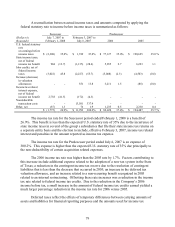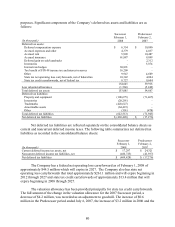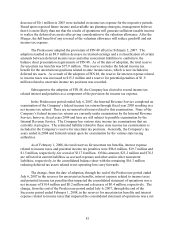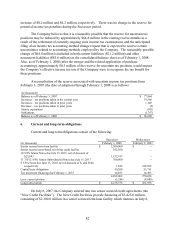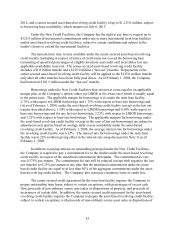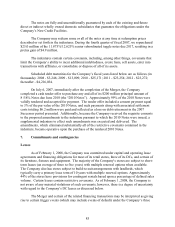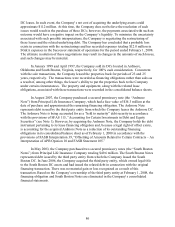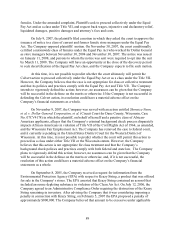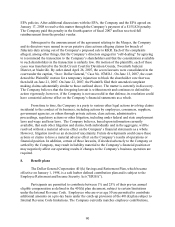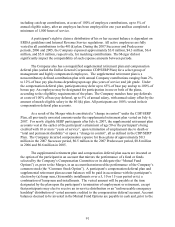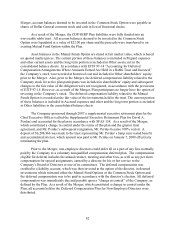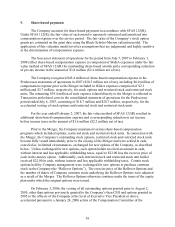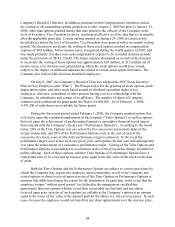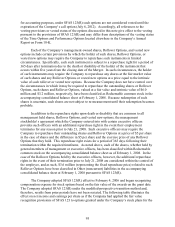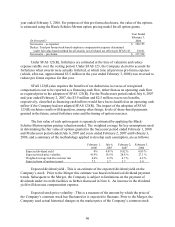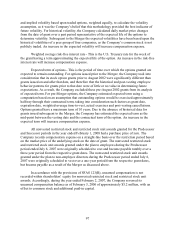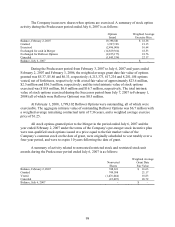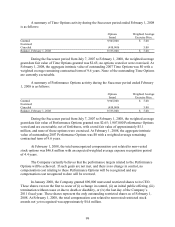Dollar General 2007 Annual Report Download - page 91
Download and view the complete annual report
Please find page 91 of the 2007 Dollar General annual report below. You can navigate through the pages in the report by either clicking on the pages listed below, or by using the keyword search tool below to find specific information within the annual report.89
females. Under the amended complaint, Plaintiffs seek to proceed collectively under the Equal
Pay Act and as a class under Title VII, and request back wages, injunctive and declaratory relief,
liquidated damages, punitive damages and attorney’ s fees and costs.
On July 9, 2007, the plaintiffs filed a motion in which they asked the court to approve the
issuance of notice to a class of current and former female store managers under the Equal Pay
Act. The Company opposed plaintiffs’ motion. On November 30, 2007, the court conditionally
certified a nationwide class of females under the Equal Pay Act who worked for Dollar General
as store managers between November 30, 2004 and November 30, 2007. The notice was issued
on January 11, 2008, and persons to whom the notice was sent were required to opt into the suit
by March 11, 2008. The Company will have an opportunity at the close of the discovery period
to seek decertification of the Equal Pay Act class, and the Company expects to file such motion.
At this time, it is not possible to predict whether the court ultimately will permit the
Calvert action to proceed collectively under the Equal Pay Act or as a class under the Title VII.
However, the Company believes that the case is not appropriate for class or collective treatment
and that its policies and practices comply with the Equal Pay Act and Title VII. The Company
intends to vigorously defend the action; however, no assurances can be given that the Company
will be successful in the defense on the merits or otherwise. If the Company is not successful in
defending the Calvert action, its resolution could have a material adverse effect on the
Company’ s financial statements as a whole.
On November 9, 2007, the Company was served with an action entitled Sheneica Nunn,
et al. v. Dollar General Corporation, et al. (Circuit Court for Dane County, Wisconsin, Case
No. 07CV4178) in which the plaintiff, on behalf of herself and a putative class of African-
American applicants, alleges that the Company’ s criminal background check process disparately
impacts African-Americans in violation of Title VII of the Civil Rights Act of 1964, as amended,
and the Wisconsin Fair Employment Act. The Company has removed the case to federal court,
and it currently is pending in the United States District Court for the Western District of
Wisconsin. At this time, it is not possible to predict whether the court will permit this action to
proceed as a class under either Title VII or the Wisconsin statute. However, the Company
believes that this action is not appropriate for class treatment and that the Company’ s
background check policies and practices comply with both federal and state law. The Company
plans to vigorously defend this action; however, no assurances can be given that the Company
will be successful in the defense on the merits or otherwise, and, if it is not successful, the
resolution of this action could have a material adverse effect on the Company’ s financial
statements as a whole.
On September 8, 2005, the Company received a request for information from the
Environmental Protection Agency (EPA) with respect to Krazy String, a product that was offered
for sale in the Company’ s stores. The EPA asserted that Krazy String contained an aerosol that
included an ozone depleting substance in violation of the Clean Air Act. On July 12, 2006, the
Company agreed to an Administrative Compliance Order requiring the destruction of the Krazy
String remaining in inventory. After advising the Company that it was considering imposing a
penalty in connection with Krazy String, on February 5, 2007 the EPA proposed a penalty of
approximately $800,000. The Company believed that amount to be excessive under applicable


